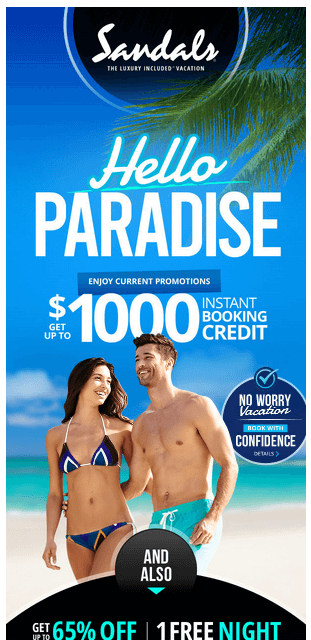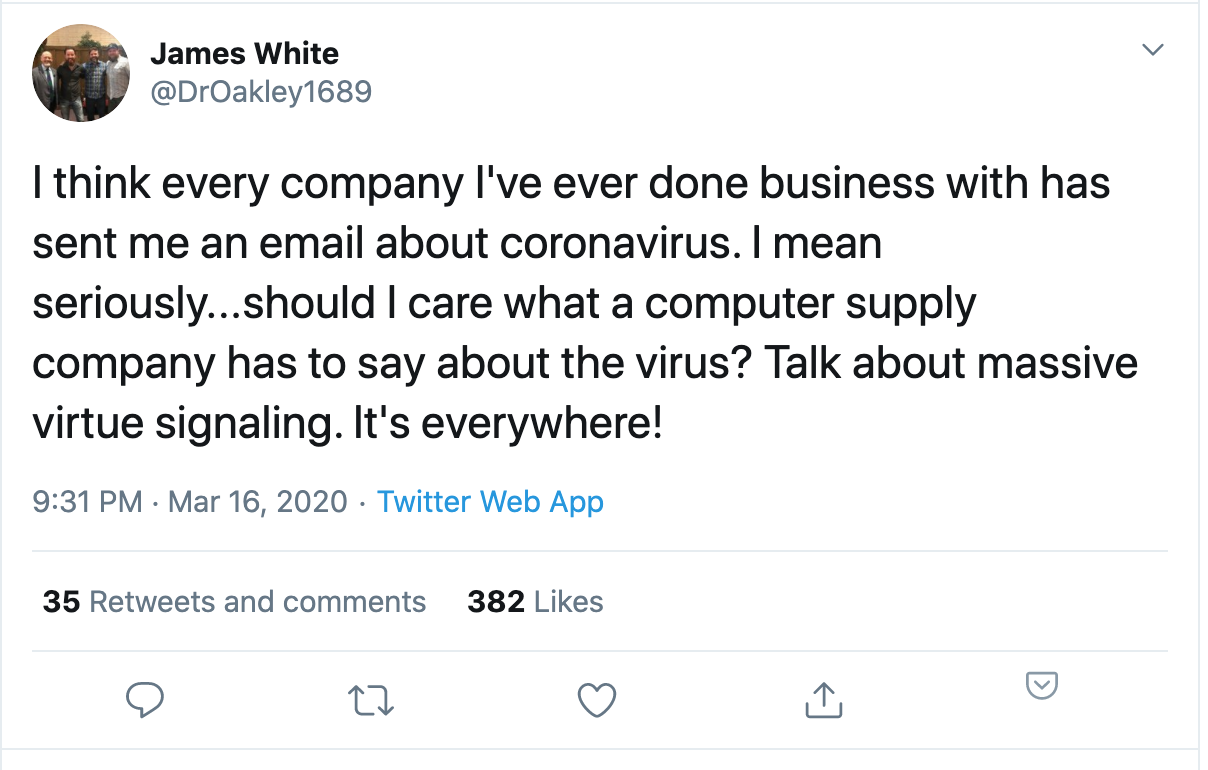Up until March of 2020, we were already living in a world where time collapsed and stretched. Each day brought horrific or hopeful news, along with more Internet arguments. Days dragged and months flew. But now? We joke that time no longer has meaning as our shuttered schedules keep us at home, and we try to survive in the present, uncertain of plans for the future.
The phrases every organization, anchor, journalist, politician, and brand keep repeating: “Amid these uncertain/unprecedented times…” “We’re in this together…” “The new normal…” ad nauseam. But what else is there to say, really?
As a digital native and social media manager, it’s been interesting to observe the different responses of organizations and brands of every size as the country is struggling with being forced to a standstill. We are a nation in motion - slowing down is a foreign concept. Not only that, but the reason is scary, confusing, and turning the way we used to live upside down. How can anyone accurately convey feelings about this?
Brands and corporations are in a pickle. Capitalism has taken its toll on America and, in order to be successful, it’s only made economic sense for companies to condense power, create ruthless efficiency, and put profits before people. As marketers and advertising agencies, we help shape the narrative, using data, manipulation, and design to influence buyers and increase sales.
Consumers are fearful and wary. We all are. With the death toll and unemployment numbers increasing daily, staying overly chipper, cool, braggadocios, or overly jokey (depending on your archetype) feels, at best, out of touch. If it hasn’t hit home yet, let me be the one to wake you up: this isn’t Kansas, and the old way of advertising is, if not over, then at least in hibernation.
We are starting to see a pivot from courageous brands (who’ve hired forward-thinking marketers and agencies) from the outskirts to the center of the storm. Whether stepping up to give and produce needed medical supplies and pledging to protect their workers to simply acknowledging the reality and offering support, it’s easy to tell who’s taken the leap to lead, and who hasn’t reviewed their scheduled posts for tone-deaf social updates.
It’s challenging to strike a balance between hopeful and hokey, but there are a few patterns I see emerging from companies who quickly found their niche in the new normal, and are reinforcing their core values as opposed to co-opting a tragedy to push product and services.
Ads and Activations Getting It Right:
Brands are picking opportunities to highlight how they are helping their customers and employees during COVID, sharing heartwarming messages of solidarity, and reminding consumers how to stay safe.
Some are shifting operations and forging new partnerships to provide services and (of course) money. One brand I noticed right away was &pizza. My local shop, located blocks away from multiple hospitals, not only pledged to pay its employees more during the crisis, but also committed to delivering their tasty pizza to frontline workers. Their brand focuses on being direct, down to earth, and connected - and they delivered (literally!).
Consumer needs and struggles are more than just material. Around the globe, we’re being encouraged to stay at home - and comfort, home-goods based brands are helping reinforce these mandates through playful and engaging messaging. Utilizing the latest and greatest in social technology (the creativity on TikTok is astounding!) we’re laughing, smiling, and sharing happy tears with the likes of Ikea’s #StayHome , Mariah Carey’s hand-washing instructions, and Oreo’s global #StayHomeWithOreo spinoff of its Stay Playful campaign.
You Poor, Unfortunate Brands
The travel and tourism industry is tanking, with a months-long cruise ship quarantine being one of the first big set of coronavirus cases in the US. AND YET.
We’re seeing cruise line ads! Both Sandals and Norwegian Cruise Lines followed through with a travel promotion campaign, with the latter refusing to issue refunds and telling customers that the virus can’t survive tropical climates. It’s bad enough we’re getting mixed messages from the government - lying to your customers… is not a great strategy.
Other brands have attempted to convey empathy and hope, but by not acknowledging their current practices they reveal what their true priority is: the bottom line. Looking at you, Adidas. Bragging about being able to stay open while overlooking the fact that they’re not giving their employees hazard pay fell flat and incited anger from potential consumers - consequently the CEO reversed his position 24 hours later.
There has been a lot of content coming in the form of PSAs and attempts at memes from organizations that are supposed to be leading the efforts in informing the public about the dangers and precautions needed during this crisis. Unfortunately, the video spots have been… lackluster, to say the least. Long videos with talking heads are overloaded with info and don’t stir emotion (which in turn drives action.
This reinforces my theory on the need for nonprofits (and government agencies) to invest in their marketing teams. Understaffing and underpaying the people responsible for sharing your message leads to either talented workers who burn out and flee or less skilled employees who will accept increased workload and lower pay (and often, a combination of both). Pay for your creative - and turn to agencies, if you have the budget .
Taking cues from consumer brands can inspire new strategies. One offering I’m loving is how many museums, zoos, and even performing arts centers are “opening” their doors virtually through tours, access to content, and webcams. This not only satisfies (as much as possible) a desire to see new things similar to when one travels, but it also opens the doors and shares these experiences with anyone who has a wifi signal. There’s a lot of talk around equity in the arts, and being forced to accommodate virtually may actually help achieve that goal. I’m currently enjoying a Metropolitan Opera performance!
Staying Quiet Hurts, Not Helps
It’s tempting, especially in more bureaucratic or conservative institutions, to take an excessive amount of time to vet and pick apart statements and strategies in an effort not to upset or offend anyone. An even worse strategy is not to say anything at all.
Potential and current customers will lose track of you amidst the noise, and possibly switch to a competitor who was able to pivot and present an authentic offering or message that further cemented its values and became top of mind in your category. This is no time to “weather the storm”. The storm is here to stay. Don’t ignore it, don’t hide. Courageously dig in to your company’s core belief systems, and act to align with them.
That being said…
Please Stop Sending Concerned CEO Emails
The easiest way to communicate with customers is through email, and everyone seems to have hopped on the bandwagon to assure their customers they are paying attention (and often, to offer deals…). This is a judgement call - it’s possible that if (big if) your brand is a necessary product or service consumers need during the pandemic - an essential business, if you will - then it’s important to share how you’re keeping your employees and consumers safe.
But I’ve gotten dozens of emails from random brands reassuring me that “they are thinking of me during these strange and difficult times” and “are doing everything they can to keep production flowing”. Followed up by discounts for clothing that I will very likely not need to wear in the next several months. No one to show off to!
Slate recently published an article about one writer’s experience with all the brands he accidentally subscribed to over the course of many years. This virtue signaling is icky and annoying. Stop it.
too long, didn't read:
TLDR:
Dig deep to define and develop (if you haven’t already) your brand’s core beliefs. Why did you start your company? What is the most important value all employees should hold that drives your business forward? If you were going to sum it up in a sentence, what would it be?
Act in ways that will benefit consumers and bring people together.
Keep the message appropriate - consider the context you are entering. Steer away from ideas that take the situation lightly
Take inspiration from other brands, and leverage your marketing team to dream up something new. Follow their advice - even if it’s outside of your comfort zone.
Save emails for relevant and important messages.
You’ve got this! I believe in you! And if you flub, I’ll be sure to leave a snarky comment on your social media post letting you know.




